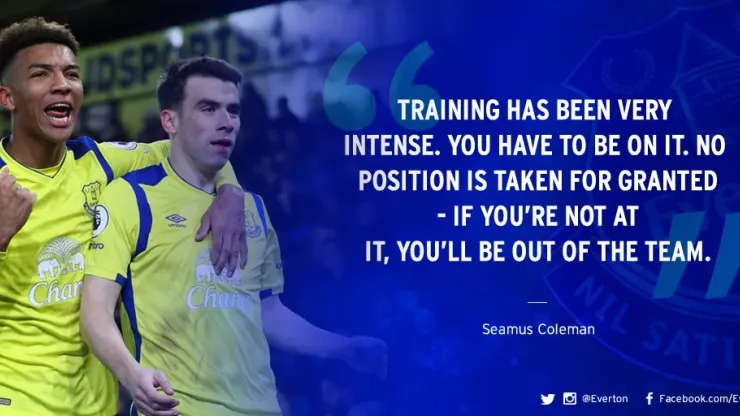Identity is a throwaway term in modern football parlance. But it’s important.
It can be a crutch for managers who are toiling in the nascent stages of their spell with a new club. If supporters can see a methodology forming, poor results are more tolerable.
For Mauricio Pochettino and Jurgen Klopp in their respective positions at Tottenham Hotspur and Liverpool, fans were contented during indifferent starts, as both men were clearly putting the wheels in motion for a significant overhaul in terms of style and personnel.
When Everton appointed Ronald Koeman in the summer, it was evident a similar scale refurbishment was needed. Yet after a positive start to the season, results nosedived, agricultural tactics were implemented and any sense of progress was lost. The manager was still rummaging round in the wardrobe deciding what to pack before even beginning the long journey ahead.
Now, after the 1-0 win over Crystal Palace at Selhurst Park on Saturday, the Toffees are out of the drive and on their way at least. Indeed, since the 2-1 win over Arsenal in December, Everton have looked a lot more like Koeman’s Everton.
The Dutchman’s Southampton side were synonymous with dynamic football. In possession and out of possession, there was a vim and urgency to Saints’ work, making them one of the most entertaining and effective teams in the Premier League. During a run of one win in 10 games prior to the Gunners triumph, those physical traits were scarce in Everton.
In fairness to the manager, the Everton squad he inherited was built with flair rather than forcefulness in mind—the talented but tepid Gerard Deulofeu, now of AC Milan, epitomized the desired attributes under Roberto Martinez. The summer signings of Idrissa Gueye, Yannick Bolasie and Ashley Williams—hard-working, powerful footballers—offered an insight into what Koeman felt this side was lacking.
Energy, intensity and aggression have been prioritized during a positive recent run. Against Arsenal, James McCarthy and Aaron Lennon, enlivened the side, and since then, Tom Davies’ introduction and Mason Holgate’s reintegration into the XI have refreshed those in blue. The extra zip in the play of Ross Barkley, Leighton Baines and Seamus Coleman has also not gone unnoticed.
The benefits to that hard work have been clear. In home Premier League games against Manchester City and Southampton early in 2017, the Toffees trampled over their opponents late in games, while against Palace, they were composed and collected against a creaking defensive structure. Netting 10 goals in the last 10 minutes of matches this season is no coincidence.
For the players, seeing these plans bear fruit is vital in buying into the manager’s methods. There’s been a major upturn in the recent form of Coleman, Barkley is have more of a consistent influence on games and Romelu Lukaku is benefitting from a lively attacking partner in Kevin Mirallas. It’s there in plain sight what can be done with more application. It’s a process players will want to be part of.
Adaptability is also crucial to any manager thriving, which is why plenty tied to Everton chose to judge the clashes with City and Palace in tandem. Despite Koeman describing the 4-0 win against City as “perfect,” there was a nervousness about the trip to south London and the contrasting challenge Everton would face.
SEE MORE: Schedule of Everton games on US TV and streaming
After all, a visit to a pragmatic team under a manager seeking his first league win since taking the job gave the Toffees the chance to become the butt of a joke and it’s a role they’ve assumed with distinction on multiple occasions in the past. But what followed was a professional, no frills away display.
The Palace win feels like the cap on recent progress, not the City mauling. This, undisputedly, is a game Everton could dropped points in under Koeman’s predecessor; the team, in the past, would have lost patience, lacked the fitness to press on and, most certainly, would have kicked the ball out of play so the visitors could tend to the stricken Jeffrey Schlupp. It was a win that had Koeman’s fingerprints all over it.
Seventh in the table, after 13 points taken from the last 15 on offer and just five points back on Manchester United, suddenly this is a team looking up the table rather than nervously over their shoulder.
To bridge that gap, Koeman must continue this positive process in weeks to come. Clashes against Stoke City, Bournemouth, Middlesbrough and Sunderland are up next, matches in which the Toffees will be favorites to win, although must showcase more inventiveness in their play and aggression off the ball; Leicester City, who sat deep, dug in and played on the break in their FA Cup win at Goodison Park showed there are still some serious flaws in this setup.
Ultimately, it’s a huge ask for the team to reel in a United side bristling with world-class attacking talent. But that it’s even on the agenda is testament to Koeman getting his mantras across. After much jostling and refining, finally the manager looks to have his template in place.
200+ Channels With Sports & News
- Starting price: $33/mo. for fubo Latino Package
- Watch Premier League, Women’s World Cup, Euro 2024 & Gold Cup
The New Home of MLS
- Price: $14.99/mo. for MLS Season Pass
- Watch every MLS game including playoffs & Leagues Cup
Many Sports & ESPN Originals
- Price: $10.99/mo. (or get ESPN+, Hulu & Disney+ for $14.99/mo.)
- Features Bundesliga, LaLiga, Championship, & FA Cup
2,000+ soccer games per year
- Price: $5.99/mo
- Features Champions League, Serie A, Europa League & Brasileirāo
175 Premier League Games & PL TV
- Starting price: $5.99/mo. for Peacock Premium
- Watch 175 exclusive EPL games per season






